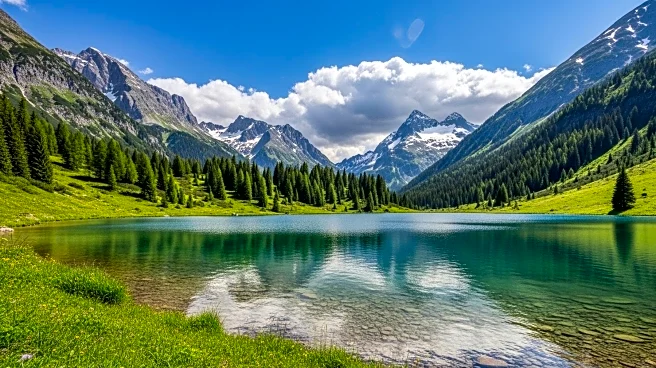What's Happening?
In the Patagonian village of El Chaltén, a significant environmental issue has arisen due to untreated sewage contaminating glacier-fed rivers. The problem was first identified in 2016 when residents noticed waste flowing into the Fitz Roy and Las Vueltas rivers. Conservationist Marie Aniére Martínez and park official Lorena Martínez formed a group to investigate, leading to a landmark court ruling against water pollution in the Los Glaciares National Park. Despite this legal victory, the pollution persists, exacerbated by the seasonal influx of tourists that overwhelms the local sanitation infrastructure. The community, supported by the Escazú agreement, filed a lawsuit that forced authorities to commit to upgrading waste management systems by January 2025. However, activists continue to demand more robust enforcement as untreated sewage and resistant bacteria threaten public health.
Why It's Important?
The ongoing sewage crisis in El Chaltén highlights the challenges of balancing tourism with environmental sustainability. The village, a popular destination for hikers, sees its population swell during peak tourist season, straining its sanitation systems. This situation underscores the need for improved infrastructure to protect both public health and the natural environment. The presence of multiresistant bacteria in the water poses a significant health risk, potentially affecting not only local residents but also the broader ecosystem. The case also illustrates the importance of legal frameworks and community activism in holding authorities accountable and ensuring environmental protection.
What's Next?
The authorities have committed to upgrading the sewage treatment facilities by January 2025, but the community remains vigilant. Activists are supporting new legal actions against the national parks administration for projects conducted without environmental assessments. The Guardians of the El Chaltén Basin have established a committee to ensure public oversight and access to technical information, aiming for sustainable governance. The situation calls for continued monitoring and advocacy to ensure that the promised infrastructure improvements are implemented effectively and that the environmental impact of tourism is managed responsibly.
Beyond the Headlines
The El Chaltén sewage crisis reflects broader issues of rapid development without adequate environmental planning. The village's expansion, driven by tourism, occurred without a comprehensive environmental framework, leading to the current challenges. This case serves as a cautionary tale for other tourist destinations, emphasizing the need for sustainable development practices that prioritize environmental health. The involvement of international agreements like the Escazú treaty highlights the role of regional cooperation in addressing environmental issues, offering a model for other communities facing similar challenges.










